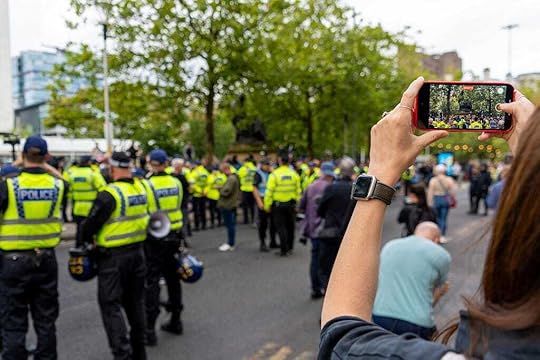The End of Privacy: denial of transparency is Obstruction of Justice
Having surrendered our right to privacy, we turn to transparency — the right to observe and collect evidence with our mobile devices — and demand laws that preserve this right or risk losing every remaining “inalienable” right.
 Photo by Mehmet Keskin on Unsplash
Photo by Mehmet Keskin on UnsplashPrivacy? Forget it. Everything is out there now.
From traffic cameras, CCTV (Closed-Circuit TV), gnat-sized surveillance cameras, collection of personal information by social networks, credit bureaus, and government agencies like the FBI, NSA, IRS, and DOGE, surveillance has cancelled privacy.
But if we can look back, if we demand the right to watch those who watch us, we have a chance to continue our experiment in democracy and retain our historically unique freedoms — however imperfect and limited they are! Futurist and science fiction author David Brin coined the term sousveillance for the opposite of surveillance: “We shall answer surveillance with sousveillance, aggressively insisting on our right to supervise authority, because we care less about what elites know about us than what they might do to us.”
At a bare minimum, We the People must retain the right to use our phones to video the use of power and share that evidence as we wish — as Brin put it: “… in altercations with authority, what other recourse can a citizen turn to, than the Truth.”
In 2013, Glik v Cunniffe, the US justice system declared that citizens have the right to record their interactions with police in public places. But since this ruling was issued by an appeals court, not the US Supreme Court, it’s vulnerable and will be challenged again. And it’s not likely to survive the Roberts Court unless congress passes a law redefining the freedom to record public events.
Where privacy doesn’t exist, denial of transparency becomes obstruction. Photo by Mylo Kaye on Unsplash
Photo by Mylo Kaye on UnsplashObstruction of Justice is the crime of interfering with the justice system by among other things, destroying evidence.
When the police turn off or disable their body or dash cameras, evidence is destroyed before it can be collected, that’s Obstruction of Justice but it isn’t illegal.Anyone, including government officers, who deletes or removes recordings of criminal events from your phone is committing Obstruction of Justice but isn’t illegal.Anyone, including government officers, who prevents you from recording public events by any means, including seizing the recording device, damaging the device, blocking the viewfinder of the device, or removing you from the scene without cause, is committing Obstruction of Justice.When authorities search through your files including personal messages, social net posts, photos, and recordings without a warrant it’s an explicit violation of the 4th Amendment to the US Constitution: the right to be secure in our persons, houses, papers, and effects.While these obvious violations of Obstruction of Justice occur every day, they have not been written into law.
In the absence of a Supreme Court that favors individual rights over government power and the rights of corporations, the right to look back and record the actions of authority won’t survive court review. Therefore, we must persuade the lawmakers who represent us to:
Formalize our right to record public events.Establish that the violation of our right to record is obstruction of justice.Classify the acts of disabling body-cams, dash-cams, and any other recording devices, and the act of deleting recordings as Obstruction of Justice.What you can do:1. Identify your representatives in your state legislature and at the federal level — go to BallotPedia , type in your street address (there’s a prompt for your email but you can leave it empty), and the page will deliver links to your state and federal representatives.
2. Go to the web pages of your two federal senators and one representative, find their message forms, and compose your message, or if you don’t have time, cut/paste/edit the following text (be sure to type in their names and sign with yours).
Example text:Dear ,
Citizens’ use of cell phone cameras for recording evidence of public events has exposed thousands of crimes that would otherwise have been unseen, unreported, and allowed to continue. But the right to record evidence hangs by the thread of an appellate court decision. The 2013 Glik v Cunniffe decision of the First Appeals Court that confirmed the citizens’ right to record interactions with authority in public has not been confirmed by the Supreme Court but will surely be challenged.
The people’s right to observe public events includes our right to record criminal evidence, but that right is frequently violated by government authorities and the police. In a world where privacy is a forgotten concept and surveillance technology — private, corporate, and governmental — is increasingly used for evidence of criminal conduct, our right to record authority in public must be preserved.
Please stand up for the people’s right to record evidence of public events through the use of our mobile devices!
Compose and pass legislation to:
(1) Explicitly codify the right to record public events including the public actions of police and government agents with cameras and recorders including cell phones.
(2) Codify as Obstruction of Justice the act deleting or removing recordings from mobile devices; forcibly preventing people from recording public events by any means, including confiscating seizing the recording device, damaging the device, blocking the viewfinder of the device, etc, and by detaining, arresting without warrant, or physically disabling the person making recording by any officer of the government including police, ICE, DHS, FBI, Secret Service, etc,
Thank you for your prompt attention to this pivotal issue,
[image error]



